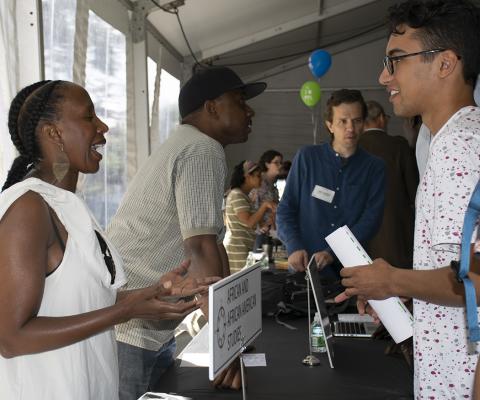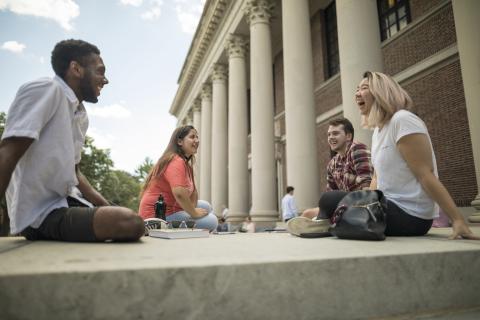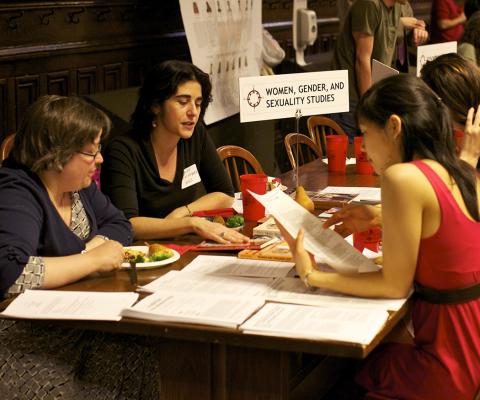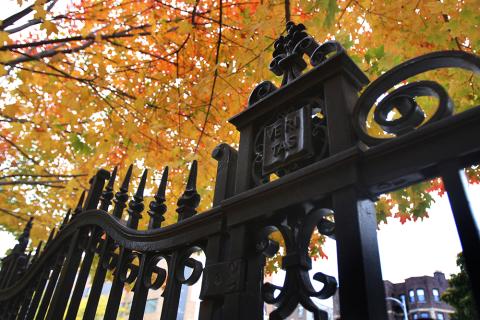Alert: Offices Closed Monday, February 16
The Admissions & Financial Aid Office will be closed for Presidents' Day on Monday, February 16. We will re-open with normal business hours on Tuesday, February 17.
Last Updated: February 13, 5:01pm

Advising

Pre-Concentration Advising
Your first year at Harvard can sometimes be really difficult when it comes to making new decisions and experiencing the fear of missing out. This is especially true when you don't have anyone to turn to for advice. That's why there are so many resources for first-year students to use when they feel like they could use helpful tips from someone who made it through college and can offer a listening ear. The trouble comes when figuring out who to go to for a specific issue. There are so many choices for advising (and frankly, so many strange names for them) in your first year that it can be overwhelming for some. That's what this guide is here for.

Okay, Great! So Who is This "Proctor" Person I Keep Hearing About?
Excellent question! Proctors are probably one of the easier advising resources to contact in your first year because they live right next to you. At this point, you've definitely heard the word "entryway" once or twice. Anywhere from 20-40 students live in each entryway. Each First-Year dorm splits up entryways differently, and each entryway has access to someone called a Proctor.
Proctors are similar to Resident Advisors at other colleges, except a lot of the time they are graduate students or working professionals with a passion for helping college students navigate college. They live where you do and they're always there for you if you need advice on anything from academics to roommate disagreements.
Proctors and PAFs work together to host regular Study Breaks for their entryway, which are small get-togethers where students can hang out with each other and their Proctors, learn about different co-curricular opportunities and other academic resources on campus, and decompress from the stress of academic life.
Proctors are generally the person to turn to if you feel like there's a conflict with someone in your dorm room or entryway that you can't resolve on your own. They also might serve as your official First-Year Academic Advisor in addition to being your Proctor.

Sweet. So What, Exactly, Does My Pre-Concentration Advisor Do?
First-Year Academic Advisors are people from every area of the University – faculty, graduate students, administrators – who are dedicated to supporting and guiding you in your intellectual exploration. They are there for you when you have questions about anything related to what you want to do – choosing courses, finding a concentration (what other schools call majors), doing research, studying abroad, to name a few areas of conversation.
Ahead of each course registration period during your first year, you will meet with them to decide which classes you want to enroll in. Your advisor will help you learn how to get information about courses so that you can make well-researched decisions. During this meeting, your Pre-Concentration Advisor will most likely lift the advising hold on your Crimson Cart so that you can go ahead and enroll in the classes you choose. Then you will continue meeting with your advisor throughout the semester to talk about how your courses are going, point you to opportunities and resources that match your interests and connect you with academic resources like the Writing Center or peer tutors.

What's a PAF?
During the summer between graduating from high school and starting your first year at Harvard, you probably will (or maybe even already did) receive an email from a random Harvard college email address. It will go along the lines of:
"Hi! My name is [insert name here], and I'm going to be your PAF this year."
PAF stands for Peer-Advising Fellow. These students are sophomores, juniors, and seniors at the College. They're picked every year because they are some of the most compassionate and relatable students on campus, and they really care about making sure first-years have a person to turn to if they want inside advice on the student experience at the College. They provide guidance by sharing their own academic experiences, helping with course selection, and identifying co-
curricular opportunities like research and study abroad.
PAFs are also there to listen to you and talk you through any challenging problems. They can give you advice on anything from what restaurants are the best for midnight cravings to what student groups might help match your interests.
Unlike Resident Advisors at other colleges, PAFs don't live in the same dorm as you. Instead, they live in upper-level Residential Communities and set up meetings with you throughout the semester. PAFs also work closely with your Proctors to host study breaks and other cool events for the students in your entryway.

So Who Else Can I Go To for Advice?
There are many people who have great advice to offer. You are always welcome to visit your Resident Dean of First-Years. There are four Deans who oversee the different first-year yards. They are always willing to meet with you to talk about your experiences, and they also oversee first-year students' academic progress and supervise Proctors.
Your professors, preceptors, lecturers, and teaching fellows can offer you a wealth of advice about whatever topic or field you may be interested in. You can attend their office hours (usually listed on their course website or syllabus).
Many administrative offices have amazing advisors. The Mignone Center for Career Success (MCS), Office of International Education (OIE), Office of Undergraduate Research and Fellowships (URAF), and many others have daily office hours that anyone –including first-year students – can come and talk about their interests.

Upper-Level Student Advising
Transitioning to student housing as a sophomore comes with a new set of advisors to get to know and resources to access. If that seems overwhelming to you, this section might help.
Making the Switch from Proctors to Tutors
You may have noticed on Housing Day that no one talked about Proctors so much as they mentioned the vast array of Tutors present in each Residential Community. You may also be wondering what a Tutor does, and trust me; you're not alone in that question.
Tutors, like Proctors, live in the same entryway as you when you move into your new Residential Community. Also, like Proctors, they're always there for you if you want advice on something academic or to help settle a dispute with a suitemate. They put on study breaks once or twice a month and also work to organize cool events for the entire community to enjoy.
Tutors are pretty much split into two categories when it comes to advising you during your sophomore year. The Tutor that lives in your entryway fulfills the role that's the most similar to what your Proctor did during your first year, with the caveat that they usually meet with you a little less frequently than your Proctor did. You can, of course, always meet with them more frequently if you'd like!

So Who Helps Me With My Concentration?
Once you declare your concentration, you're going to get assigned an academic advisor from within your department. They'll become the person you go to when you need to consult on what classes you should take for your concentration, whether to do a thesis or research project, work in a lab, or how to connect what you are studying to what you want to do with the rest of your life. They may also direct you to someone within the concentration department who can provide even more insight into your topic of choice.
Sometimes your concentration's advising will be set up in a way that you can get advising from multiple people in the department. Other times you might be able to get an academic advisor who is also a tutor in your Residential Community. You should never be afraid to reach out to the Director of Undergraduate Studies in your department (or a department you're interested in) and ask them what their advising setup looks like. A lot of the time, you can also find that information on your concentration's website.

What if I don’t know what I want to concentrate in?
Each concentration has a faculty member who oversees all aspects of the concentration – from what courses can count to what research can be done. The DUS (Director of Undergraduate Studies) or ADUS (Assistant Director of Undergraduate Studies) can meet with any student – not just those who have declared a concentration – to talk about interests, advising structures, and whether your goals align with their field of study.
Most DUSs and ADUSs have open office hours which are listed on their department website.
